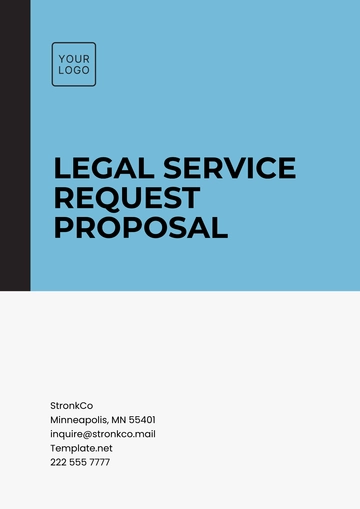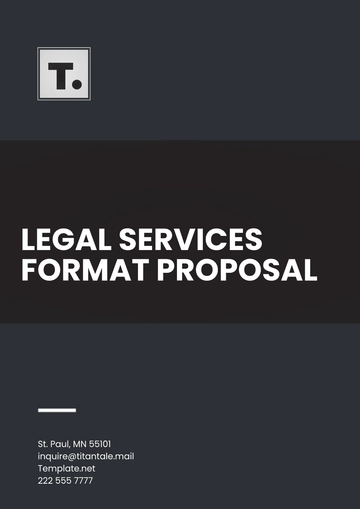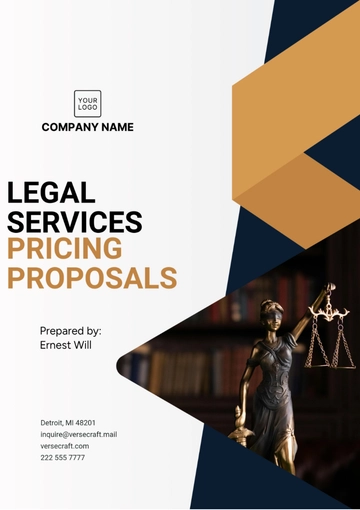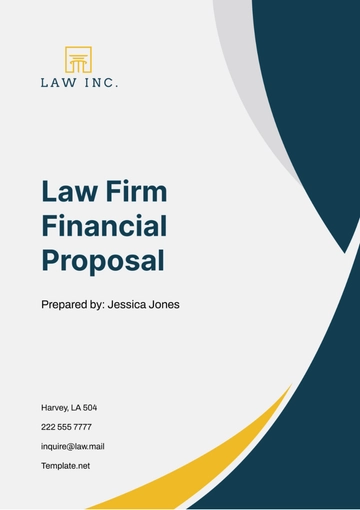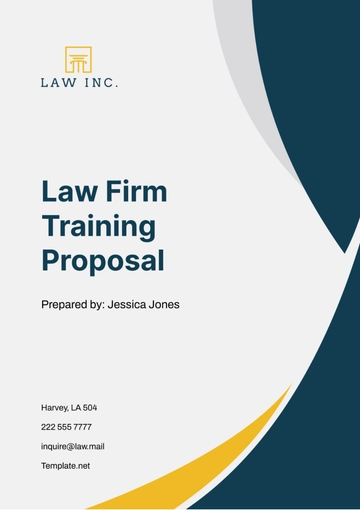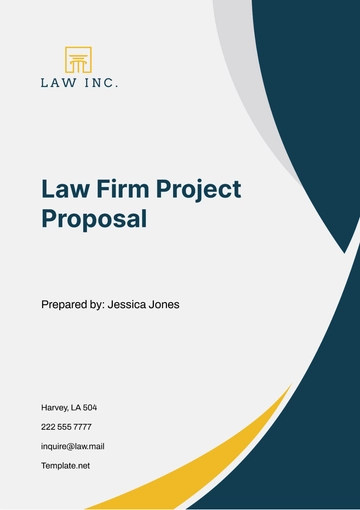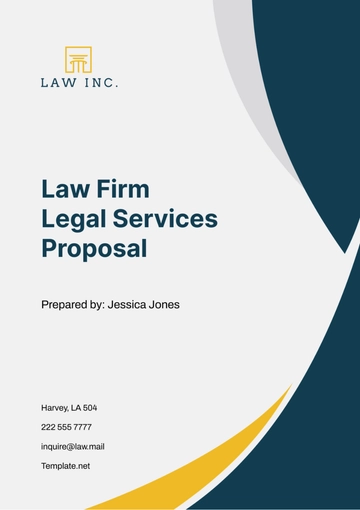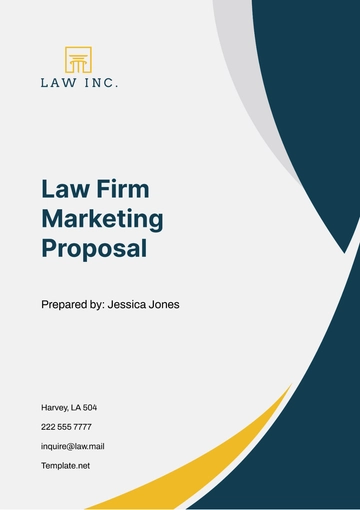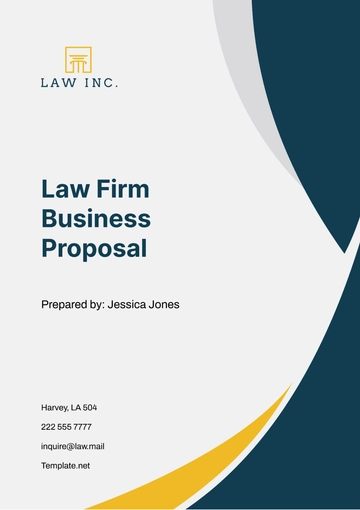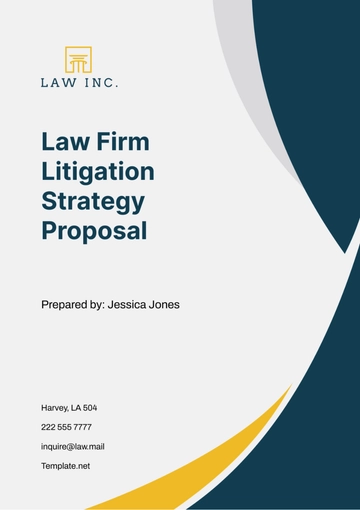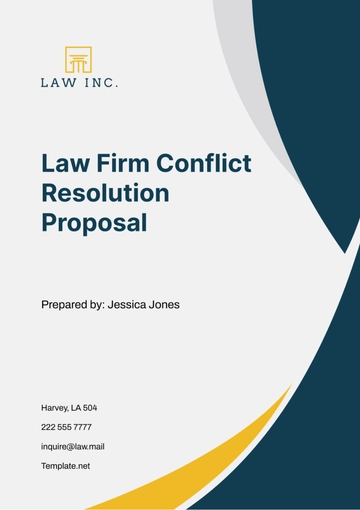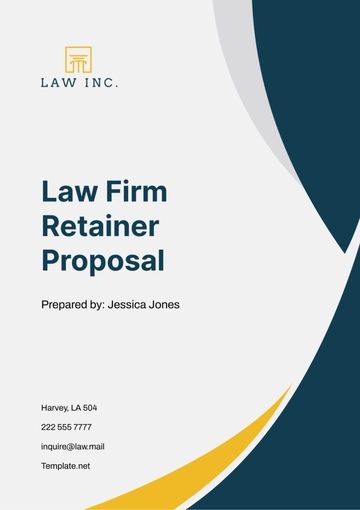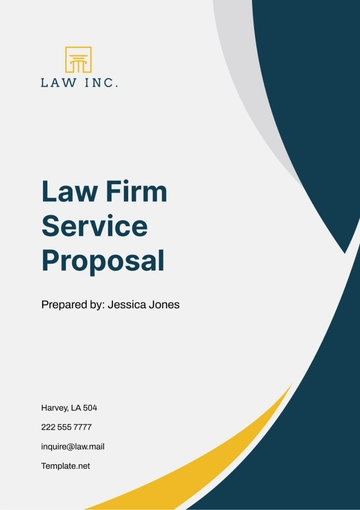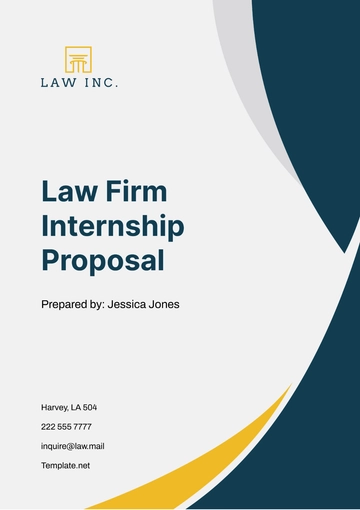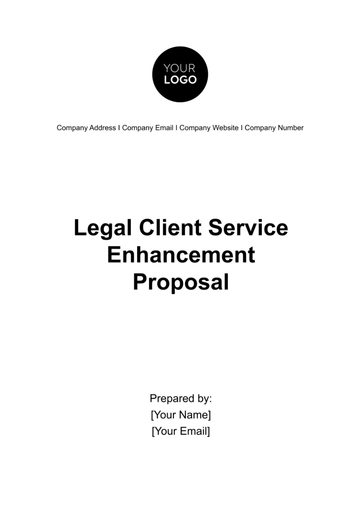Free Law Firm Litigation Strategy Proposal
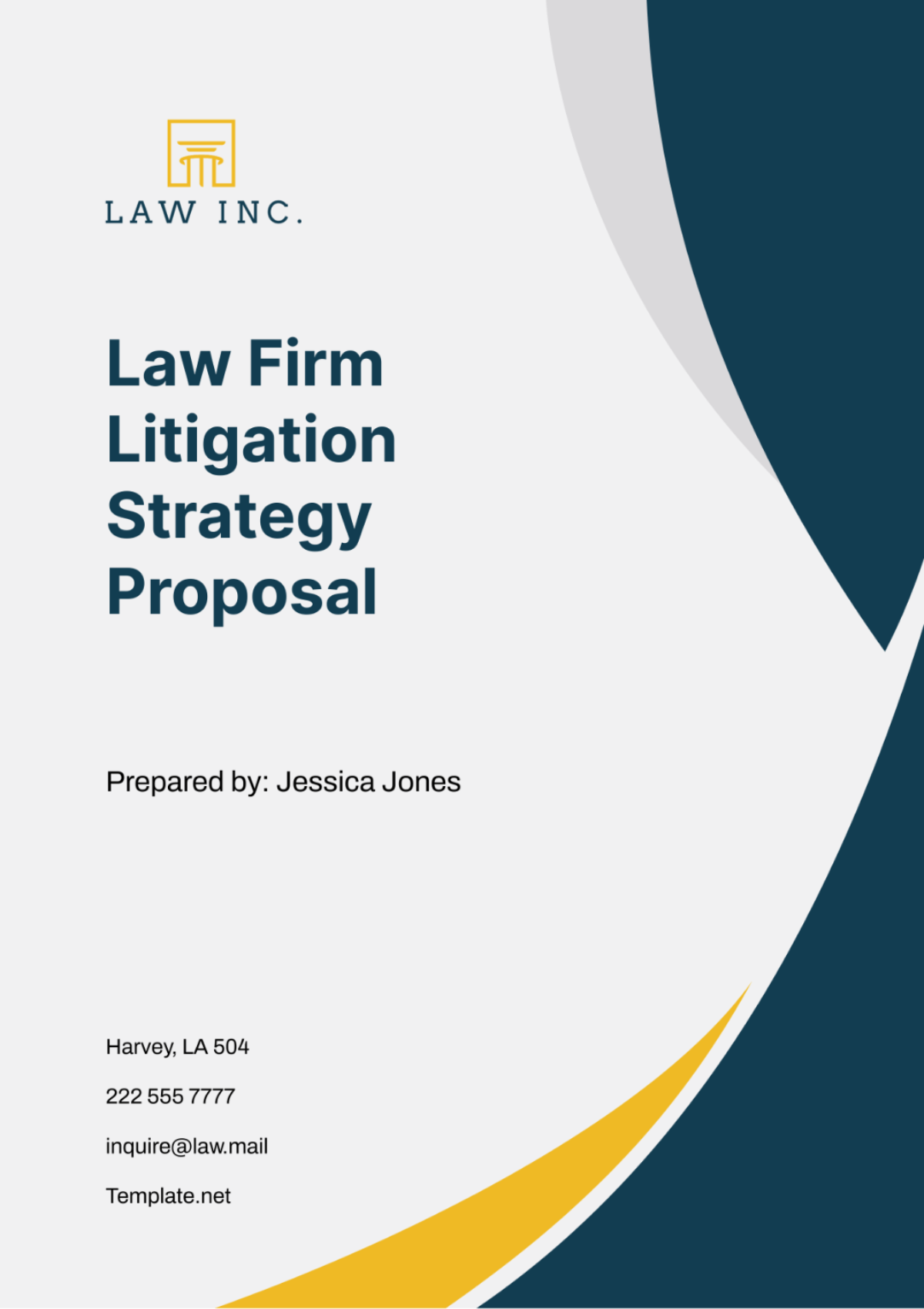
I. Executive Summary
The Law Firm Litigation Strategy Proposal presents a visionary approach to legal challenges, emphasizing strategic alignment with [Your Client Name]'s objectives to achieve optimal results in litigation. Our methodical framework is built to streamline case handling, enhance efficiency, and foster a proactive litigation posture. By integrating innovative legal technologies and methodologies, we ensure precision in legal process management, aiming to maximize favorable outcomes and reduce unnecessary expenditures.
This proposal outlines our commitment to leveraging cutting-edge legal resources and expert insights to not only meet but exceed [Your Client Name]'s expectations. Our approach involves a meticulous analysis of each case, strategic planning, and the execution of tailored strategies that are both aggressive and defensive. By doing so, we aim to safeguard [Your Client Name]'s interests, mitigate risks, and maintain a strong position in all legal proceedings.
In adopting this Litigation Strategy Proposal, [Your Company Name] will position itself as a leader in legal thought and practice. Our strategy is designed to ensure that all litigation processes are handled with the utmost professionalism and expertise, fostering trust and confidence in our ability to deliver superior legal support. The proposed strategy is comprehensive, addressing everything from preliminary case assessment to final resolution, ensuring all legal actions are well-coordinated and effectively executed.
II. Objectives
In this crucial section of our Litigation Strategy Proposal, we articulate clear, actionable objectives designed to capitalize on our firm’s formidable legal expertise, ensuring alignment with [Your Client Name]'s expectations and the highest standards of legal practice. Our goals are meticulously structured to encompass strategic planning, risk mitigation, alignment with client objectives, efficiency optimization, and outcome maximization.
Strategic Integration: Develop a coherent legal strategy that leverages our firm's extensive expertise to meet specific case demands and client needs.
Risk Assessment: Conduct thorough risk analyses to identify potential legal hurdles early, allowing for proactive strategy adjustments to avoid or minimize risks.
Client-Centric Alignment: Ensure that all legal strategies are perfectly synchronized with [Your Client Name]'s goals, delivering tailored legal solutions that resonate with their expectations.
Efficiency and Technology: Utilize cutting-edge legal technologies to streamline litigation processes, enhancing our operational efficiency and responsiveness in handling cases.
Outcome Maximization: Focus on meticulous planning and strategic execution to increase the likelihood of achieving favorable results in all litigation endeavors.
III. Methodology
The methodology of our Law Firm Litigation Strategy Proposal is carefully structured to ensure precision, compliance, and effectiveness in all phases of litigation. Below is a detailed table illustrating the systematic approach we employ, integrating technology, expert consultations, and strategic planning.
Phase | Activities | Tools and Technologies | Expected Outcomes |
|---|---|---|---|
Research and Analysis | Conduct comprehensive legal research to gather relevant case law and statutes. Analyze historical data and precedent cases. | Legal databases, AI-powered analytics platforms | A deep understanding of the legal landscape and identification of key legal precedents. |
Expert Consultations | Engage with legal experts and specialists in pertinent fields to gain insights and strategic advice. | Video conferencing software, secure collaboration tools | Enhanced strategy with expert insights, ensuring robust argumentation and evidence support. |
Strategic Planning Meetings | Regular meetings with the litigation team to develop and refine strategies based on research and expert advice. | Project management software, digital whiteboards | A clearly defined litigation strategy tailored to meet client goals and adapt to new information. |
Technology Implementation | Utilize advanced legal technologies for document management, evidence handling, and case presentation. | Document management systems, trial presentation software | Streamlined processes, precise compliance, and effective case presentation. |
This table outlines a step-by-step approach, demonstrating our commitment to thorough preparation and strategic use of technology to deliver optimal litigation outcomes for [Your Client Name].
IV. Scope of the Proposal
The scope of our Law Firm Litigation Strategy Proposal is comprehensive, encompassing every stage of the litigation process, from initial assessment to the execution in the courtroom. Below is a detailed table that outlines each stage, providing clarity on the activities, responsibilities, and objectives involved to ensure streamlined operations.
Stage | Activities | Responsibilities | Objectives |
|---|---|---|---|
Case Assessment | Initial review of case facts and legal standing. | Legal analysts and senior attorneys | To evaluate the viability of the case and identify key legal challenges. |
Strategy Development | Formulation of a bespoke litigation strategy. | Strategy team and lead counsel | To create a tailored approach that aligns with client goals and legal requirements. |
Pre-trial Preparations | Document filing, witness preparation, and pre-trial motions. | Paralegals and trial attorneys | To ensure all necessary legal documents are filed and all pre-trial requirements are met. |
Court Proceedings | Implementation of strategies during trials. | Trial attorneys and support staff | To effectively argue the case in court, ensuring strategic execution of prepared litigation tactics. |
Post-trial Follow-up | Analysis of trial outcomes and post-trial motions. | Post-trial review team | To assess the outcomes and determine necessary subsequent actions, including appeals if needed. |
This table ensures that all parties involved understand their roles and the sequential steps required, fostering a clear path from the onset of litigation to its conclusion, thereby optimizing our chances for successful legal resolutions for [Your Client Name].
V. Timeline
Our Litigation Strategy Proposal includes a detailed timeline to ensure systematic progression and efficiency throughout the litigation process. This timeline is essential for aligning all involved parties with the scheduled activities, from initial consultations to the strategic execution in the courtroom. Below is a comprehensive table that outlines each week's focus, ensuring all preparations are timely and thorough.
Week | Activities | Key Deliverables |
|---|---|---|
Week 1-2 | Initial client consultations; detailed case analysis. | Comprehensive case report, initial legal assessment. |
Week 3-4 | Develop specific litigation strategies, including potential motions and defensive mechanisms. | Draft of litigation strategy, list of required motions and defenses. |
Week 5 | Engage with subject matter experts to refine strategies and approaches. | Revised strategy incorporating expert insights. |
Week 6-7 | Prepare necessary legal documents and briefs. | Completed legal documents and briefs ready for filing. |
Week 8 | Review the proposed strategy with the client and make necessary adjustments. | Finalized litigation strategy approved by the client. |
Week 9-10 | Begin implementing the litigation strategy, filing any necessary documents and motions. | Official commencement of litigation, documents filed, initial court motions made. |
This structured timeline ensures that each phase of the litigation process is addressed with precision, keeping [Your Client Name] well-informed and actively involved in every decision, thus optimizing our approach to achieving favorable outcomes.
VI. Budget
Our Law Firm Litigation Strategy Proposal includes a detailed budget that outlines the financial commitments necessary to support a robust litigation process. This budget is carefully crafted to ensure transparency and accountability, providing clear cost estimates for each crucial activity within the litigation strategy. Below is a comprehensive table that illustrates these financial details.
Description | Cost Estimate |
|---|---|
Gathering and Analyzing Case Law, Precedents, and Client Documentation | $4,000 - $6,000 |
Developing Comprehensive Litigation Strategies Tailored to Individual Cases | $5,000 - $7,000 |
Fees for Consultations with Legal Experts or Specialists in Relevant Fields | $3,000 - $5,000 |
Costs Associated with Drafting Legal Documents and Court Filings | $2,000 - $3,000 |
Meetings to Discuss and Align the Litigation Strategy with Client Expectations | $1,000 - $2,000 |
Investment in Legal Technology and Tools for Evidence Management and Presentation | $1,500 - $2,500 |
VII. Benefits and Impact
Our Law Firm Litigation Strategy Proposal is designed to significantly enhance our firm's capabilities and deliver substantial benefits to both our operations and our client relationships. Below is a detailed table that outlines the specific benefits and the expected impact of implementing this comprehensive strategy.
Benefit Description | Expected Impact |
|---|---|
Enhanced Capacity for Handling Complex Cases | Increases our ability to manage and resolve complex litigation effectively, reducing case duration and increasing success rates. |
Stronger Client Relationships | By aligning litigation strategies with client goals, we foster deeper trust and collaboration, leading to increased client satisfaction and retention. |
Optimized Legal Strategic Planning | Streamlines case preparation and court performance, ensuring all actions are proactive and strategically sound. |
Advanced Risk Management | Identifies potential legal challenges early, allowing for timely interventions that mitigate risks and protect client interests. |
Outcome Maximization | Focuses on achieving favorable outcomes through meticulous planning and execution, enhancing our firm's reputation for excellence. |
This proposal not only positions [Your Company Name] as a leader in legal strategy and client service but also ensures that we are fully equipped to meet the challenges of today's complex legal landscape, driving success in all our litigation endeavors.
VIII. Risks and Mitigation Strategies
In our Law Firm Litigation Strategy Proposal, we acknowledge and address potential risks that might impact the success of our litigation efforts. Below is a detailed table that outlines these risks alongside their corresponding mitigation strategies, ensuring our preparedness to handle any challenges proactively.
Risk Description | Mitigation Strategy |
|---|---|
Unforeseen Legal Complexities | Utilize advanced legal analytics and continuous case law review to anticipate and adapt to complex legal issues promptly. |
Potential Client Misalignments | Maintain regular communication with clients to ensure alignment and adjust strategies as needed to reflect client objectives and feedback. |
Delays in Legal Processes | Implement efficient case management systems and proactive scheduling to minimize delays in litigation timelines. |
Technological Failures | Invest in reliable, high-quality legal technologies and ensure regular updates and backups to mitigate risks of technological failures. |
Changes in Legal Regulations and Standards | Keep abreast of legal changes through subscriptions to legal updates, training, and engaging with legal experts to ensure compliance and relevancy. |
These mitigation strategies are designed to minimize risks effectively and enhance our firm’s resilience, enabling us to navigate the complexities of litigation while upholding our commitment to delivering superior legal services to [Your Client Name].
IX. Quality Assurance and Compliance
Ensuring the highest standards of quality and compliance is crucial to the success of our litigation strategies. This section outlines the specific measures our firm takes to maintain these standards throughout every phase of the litigation process.
Area of Focus | Quality Assurance Measures | Compliance Standards Enforced |
|---|---|---|
Legal Document Accuracy | Regular audits and peer reviews of all legal documents before submission. | Adherence to local, state, and federal laws. |
Client Communication | Standardized communication protocols to ensure clarity and consistency. | Compliance with client confidentiality agreements. |
Case Handling Procedures | Structured training for all legal staff involved in case management. | Observance of bar association guidelines and ethical standards. |
Data Security | Advanced encryption and secure data storage solutions. | Fulfillment of data protection regulations, such as GDPR or HIPAA, where applicable. |
Continuous Education | Mandatory continuing legal education for all attorneys. | Alignment with continuing education requirements of legal accreditation bodies. |
This proactive approach to quality assurance and compliance safeguards our firm's reputation and enhances the trust placed in us by our clients, ensuring that every aspect of our service meets the highest legal and ethical standards.
X. Client Support and Communication
Effective client support and clear, continuous communication form the backbone of successful litigation outcomes. This section details how our firm ensures these elements are prioritized and effectively managed.
Client Interaction Stage | Support Activities | Communication Tools Used |
|---|---|---|
Initial Consultation | Comprehensive assessment of client needs and case potential. | In-person meetings, secure video conferencing. |
During Litigation | Regular updates on case progress and strategic decisions. | Email updates, client portals, and scheduled calls. |
Post-Trial | Detailed analysis of outcomes and guidance on next steps. | Personalized reports, debriefing sessions. |
Ongoing Support | Availability for follow-up questions and additional legal advice. | 24/7 client support hotline, online chat services. |
Feedback Collection | Periodic surveys and feedback sessions to improve service quality. | Online surveys, feedback forms, follow-up interviews. |
- 100% Customizable, free editor
- Access 1 Million+ Templates, photo’s & graphics
- Download or share as a template
- Click and replace photos, graphics, text, backgrounds
- Resize, crop, AI write & more
- Access advanced editor
At Template.net, we provide an easily editable Law Firm Litigation Strategy Proposal Template. It's fully customizable, adaptable to your specific requirements, and editable in our AI Editor Tool. Enhance your firm's professionalism with our intuitive, easy-to-use template. Leverage this tool to not only streamline your process but also to establish a winning litigation strategy. Be ahead of your legal competition. Strategize with Template.net.
You may also like
- Business Proposal
- Research Proposal
- Proposal Request
- Project Proposal
- Grant Proposal
- Photography Proposal
- Job Proposal
- Budget Proposal
- Marketing Proposal
- Branding Proposal
- Advertising Proposal
- Sales Proposal
- Startup Proposal
- Event Proposal
- Creative Proposal
- Restaurant Proposal
- Blank Proposal
- One Page Proposal
- Proposal Report
- IT Proposal
- Non Profit Proposal
- Training Proposal
- Construction Proposal
- School Proposal
- Cleaning Proposal
- Contract Proposal
- HR Proposal
- Travel Agency Proposal
- Small Business Proposal
- Investment Proposal
- Bid Proposal
- Retail Business Proposal
- Sponsorship Proposal
- Academic Proposal
- Partnership Proposal
- Work Proposal
- Agency Proposal
- University Proposal
- Accounting Proposal
- Real Estate Proposal
- Hotel Proposal
- Product Proposal
- Advertising Agency Proposal
- Development Proposal
- Loan Proposal
- Website Proposal
- Nursing Home Proposal
- Financial Proposal
- Salon Proposal
- Freelancer Proposal
- Funding Proposal
- Work from Home Proposal
- Company Proposal
- Consulting Proposal
- Educational Proposal
- Construction Bid Proposal
- Interior Design Proposal
- New Product Proposal
- Sports Proposal
- Corporate Proposal
- Food Proposal
- Property Proposal
- Maintenance Proposal
- Purchase Proposal
- Rental Proposal
- Recruitment Proposal
- Social Media Proposal
- Travel Proposal
- Trip Proposal
- Software Proposal
- Conference Proposal
- Graphic Design Proposal
- Law Firm Proposal
- Medical Proposal
- Music Proposal
- Pricing Proposal
- SEO Proposal
- Strategy Proposal
- Technical Proposal
- Coaching Proposal
- Ecommerce Proposal
- Fundraising Proposal
- Landscaping Proposal
- Charity Proposal
- Contractor Proposal
- Exhibition Proposal
- Art Proposal
- Mobile Proposal
- Equipment Proposal
- Student Proposal
- Engineering Proposal
- Business Proposal
